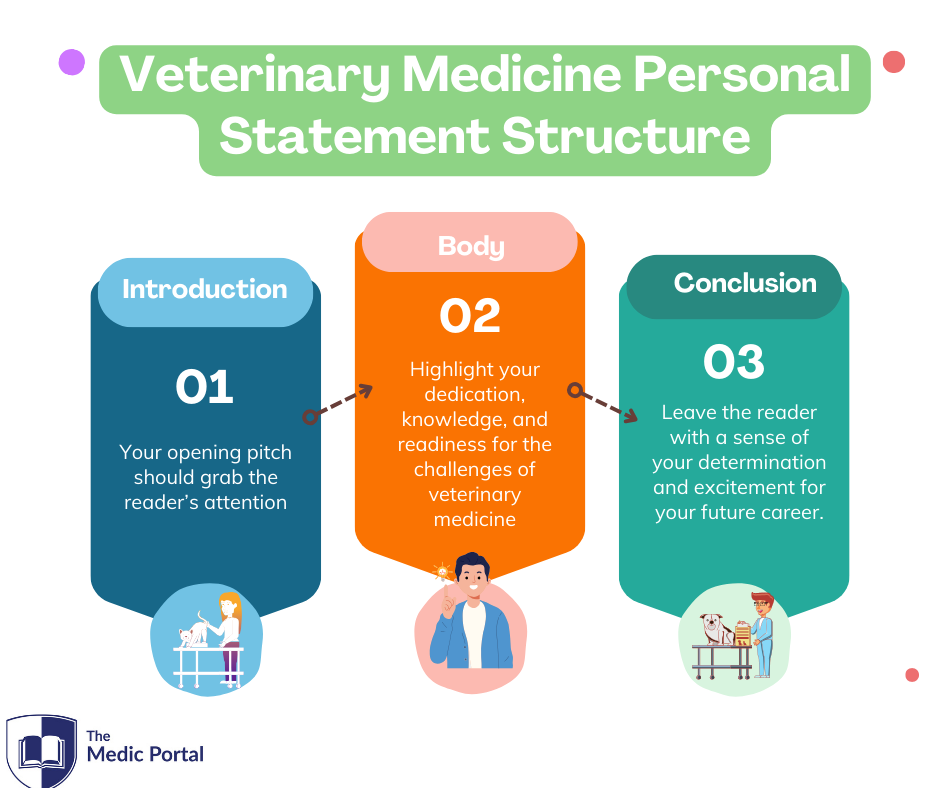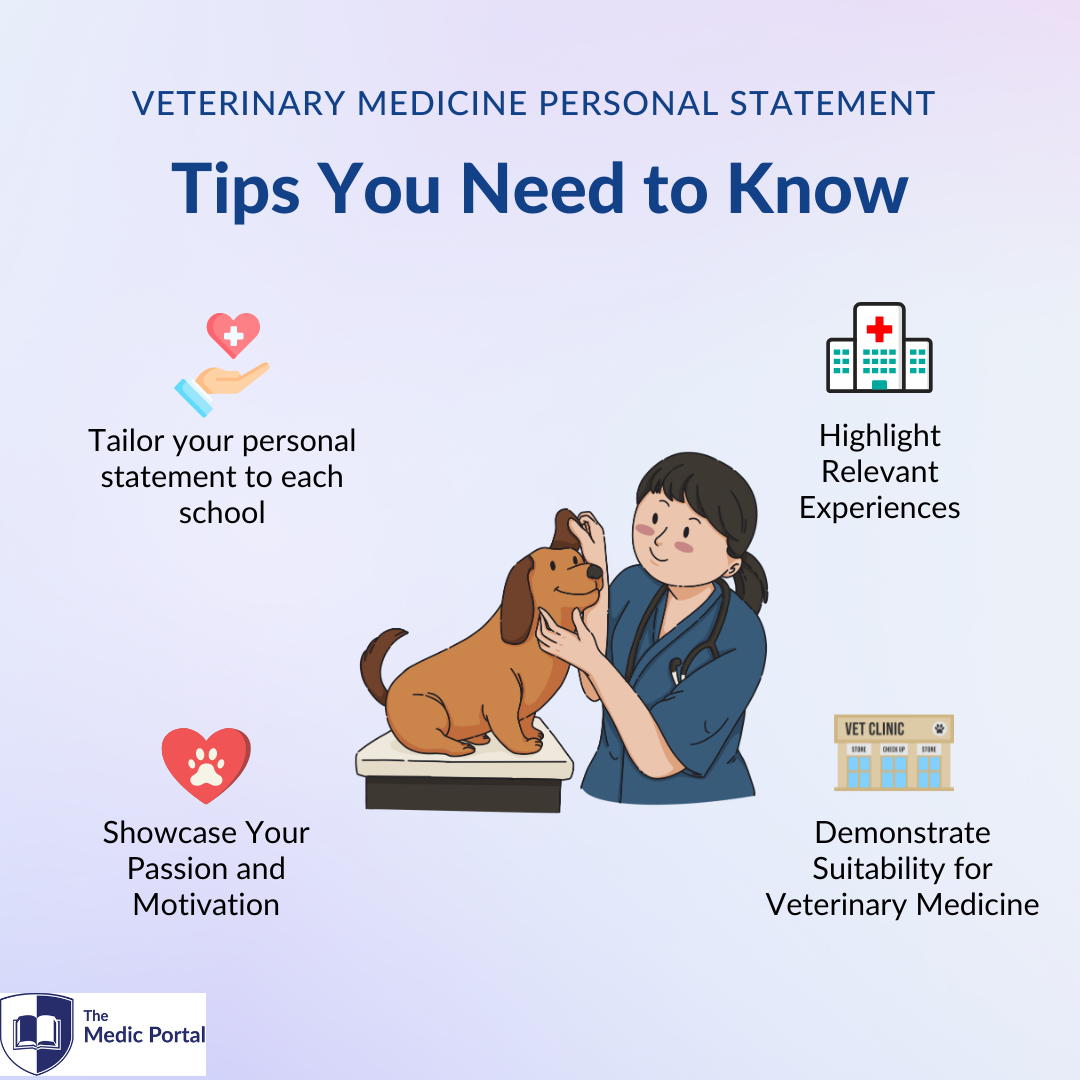How to Write a Veterinary Medicine Personal Statement
Aspiring veterinarians will all have to meet specific grade requirements and provide suitable references. This means that one of the few chances to really stand out from the crowd is your personal statement.
It is your opportunity to showcase your interest and motivations in the field, as well as experiences, skills and attributes.
Personal statements need to be submitted before the UCAS deadline, which is typically in October for Veterinary Medicine.
Structuring Your Personal Statement

The structure of a veterinary medicine personal statement consists of three key elements: the introduction, body, and conclusion. Each section serves a specific purpose in conveying your motivation, experiences, and goals.
Introduction
The first section is your introduction. This is your opening pitch, which should grab the reader’s attention. It is your opportunity to make a strong first impression.
Avoid clichés like “I have always wanted to be a veterinarian” and instead focus on stating your motivation for pursuing veterinary medicine. Highlight any personal experiences or events that sparked your interest in the field. This section should demonstrate your genuine passion and commitment to veterinary medicine.
Body
The next element is the body of your personal statement. Discuss any work experience, volunteering, or extracurricular activities that have contributed to your understanding of veterinary medicine.
Showcase transferable skills such as effective communication, problem-solving, and empathy. Provide specific examples to illustrate how these experiences have shaped your desire to become a veterinarian.
This section should highlight your dedication, knowledge, and readiness for the challenges of veterinary medicine
Conclusion
The third and final element is your conclusion. The conclusion is your opportunity to summarize the main points of your personal statement and leave a lasting impression on the reader.
Reinforce your passion, commitment, and future goals in veterinary medicine. Emphasize how your experiences have solidified your decision to pursue this career path. End with a strong and memorable statement that reflects your enthusiasm and readiness for the challenges and rewards of being a veterinarian.
This section should leave the reader with a sense of your determination and excitement for your future career.
Veterinary Medicine Personal Statement Tips

Use our tips for writing your Veterinary Medicine personal statement!
Showcase Your Passion and Motivation
You should demonstrate your genuine passion for animal welfare and explain how your motivation aligns with Veterinary Medicine’s values.
You might be motivated by family members or friends who are in the Veterinary Medicine field. Or you might have developed a passion for animal welfare from a work experience placement at your local veterinarian’s. Whatever your motivation is, you should write about it in your personal statement and explain why it is relevant.
Highlight Relevant Experiences
Veterinary schools are looking for breadth and depth of experience, which typically needs to include:
- At least one veterinary practice
- Working with large domestic animals on a livestock farm, especially dairy or lambing
- Other animal experience, such as in stables, kennels, catteries, zoos, wildlife, or rescue centres, pig or poultry farms, or something more unusual
- At least one veterinary practice, working with large domestic animals on a livestock farm, especially dairy or lambing and other animal experience like stables, kennels, catteries, zoos, wildlife, or rescue centres, pig or poultry farms or something more unusual.
You should reflect on any lessons learnt, as well as how these experiences helped you to grow. Don’t forget to specify how many weeks of experience you have obtained!
Demonstrate Suitability for Veterinary Medicine
You should demonstrate that you understand the challenges and responsibilities of the Veterinary Medicine profession and highlight your ability to work in a team, handle stress and make ethical decisions.
You should also demonstrate your commitment to ongoing learning throughout your Veterinary Medicine career and staying up-to-date with veterinary science developments.
However, you should not just consider experiences. You should also discuss key skills and attributes and provide examples of how you have demonstrated these in academic and personal settings.
Other writing tips
After writing your personal statement, you should review it carefully to ensure it is clear and coherent. You should also review it for any spelling or grammatical errors.
You should tailor your personal statement to each veterinary school you apply to. Veterinary schools have unique curricula, research opportunities, and values, and they want to admit students who align with their mission and can contribute to their community.
By tailoring your personal statement, you can highlight how your experiences, skills, and goals align with the specific strengths and values of each school, showing your genuine interest and dedication.
You might also want to get feedback on your personal statement! You could ask a relative to read it and give you their thoughts or ask a friend or a teacher to comment on what impression it made on them.
You might also like to get professional help with your personal statement,
- Get a Personal Statement Review by an Admissions Tutor
- Focus on one-to-one help with Personal Statement Tutoring for your Veterinary School application
Things to avoid
Some common personal statement mistakes include:
- Lack of focus: A common mistake is not having a clear focus or central theme in the personal statement. It is important to have a central idea or message that ties your experiences, skills, and goals together. Without a clear focus, the personal statement may come across as disjointed or lacking direction.
- Generic statements: Using generic statements or clichés, such as “I love animals” or “I have always wanted to be a veterinarian,” can weaken the personal statement. Admissions committees are looking for unique and genuine perspectives, so it is important to provide specific examples and personal anecdotes that demonstrate your passion and commitment to veterinary medicine.
- Lack of self-reflection: A personal statement should not just be a list of experiences or achievements. It should also include self-reflection and insight into how these experiences have shaped your desire to pursue veterinary medicine. Failing to reflect on the impact of your experiences can make the personal statement appear superficial or lacking depth.
- Poor organization and structure: A disorganized or poorly structured personal statement can make it difficult for the reader to follow your narrative. It is important to have a clear introduction, body, and conclusion, with each section flowing logically into the next. Use paragraphs and transitions effectively to ensure a smooth and coherent flow of ideas.
- Grammatical and spelling errors: Neglecting to proofread your personal statement can lead to grammatical and spelling errors, which can detract from the overall quality of your writing. It is important to carefully review your personal statement for any mistakes and consider seeking feedback from others to ensure it is error-free.
- Overemphasis on grades and test scores: While academic achievements are important, focusing solely on grades and test scores can give the impression that you are only interested in the academic aspect of veterinary medicine. It is important to showcase a well-rounded profile that includes experiences, skills, and qualities beyond academic performance.
A well-written, persuasive and stand-out personal statement is your key to a potential veterinary school interview.
